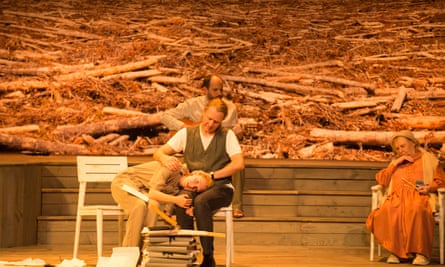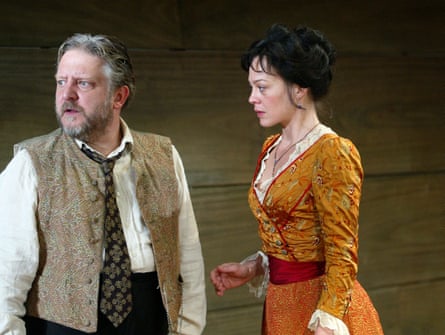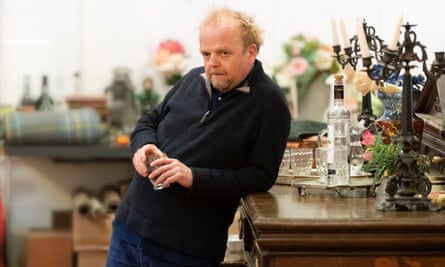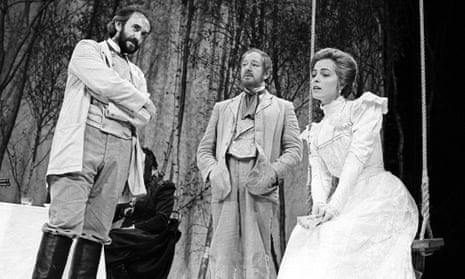Which is Chekhov’s greatest play? It tends to be the one you’ve seen most recently. But my own personal favourite is Uncle Vanya. It may not have the symphonic richness of Three Sisters or The Cherry Orchard but it confronts personal failure unflinchingly and, because of its awareness of climate crisis, currently seems the most topical. That may explain why it is on view in two theatrical capitals. Ian Rickson’s production of Conor McPherson’s new version opens this week at London’s Harold Pinter theatre. Meanwhile, Channel-hoppers can still catch Stéphane Braunschweig’s extraordinary production – played in Russian with French and, on certain dates, English surtitles – at the Odeon, Paris.
Braunschweig, who has directed all the major Chekhov plays, is explicit about why he was drawn to Uncle Vanya: he sees the characters’ destruction of each other as a “mini ecosystem” that symbolises the wilful ruination of nature. Played against a curved wooden wall – sadly, the current strikes deprived us of the forest that was part of the design when the show premiered in Moscow – the production leaves us in no doubt about the tangible despair of Chekhov’s people. Elisaveta Boyarskaya’s magnetic Yelena – the pivotal performance of the evening – is both destructive and herself destroyed. Her beauty hypnotises both Vanya and the climate-conscious doctor, Astrov. Yet she is chained by marriage to a gouty Professor whose very touch causes her to shiver with revulsion. This Yelena is clearly a woman on the verge of a nervous breakdown.

But Braunschweig’s modern-dress production never lets us forget that personal agonies are linked to climactic crisis. There is a large circular pool on stage into which the characters periodically plunge to escape the insufferable heat. At one point Evgueni Mironov’s Vanya joyfully exposes himself to a rainstorm. Anatoli Beliy’s Astrov delivers his homily about the disasters of deforestation while absorbed in his laptop, barely noticing Yelena’s boredom. Yet it’s a mark of the production’s – and Chekhov’s – subtlety that even this passionate ecologist has allowed his newly planted trees to be ruined because of his erotic obsession with Yelena.
So fierce is Braunschweig’s focus on destruction that I missed some of Chekhov’s faith in people’s capacity for endurance: Sonya’s famous final speech to Vanya, in which she tells him, “We must go on living”, is overshadowed by despair. But this is a production that combines metaphorical resonance with psychological detail. I shan’t soon forget the look of weary resignation Sonya gives Astrov when he takes a nip of vodka, having earlier forsworn drinking. And it speaks volumes that the old nurse, who remembers a world of pre-crisis stability, pointedly snubs the departing Yelena whom she sees as the source of destruction. Braunschweig may have seized on one aspect of Uncle Vanya. But, strolling in the Luxembourg Gardens on an unseasonably warm January afternoon, I felt he was entirely justified in highlighting Chekhov’s fears of environmental catastrophe.
The Russian actors perform Chekhov with a reckless emotionalism that borders on the neurasthenic. But, while I admired that, it would be wrong to say this is the only way to play Chekhov: it is right for these actors at this moment in time. Reflecting on the nearly two dozen productions of Vanya I have seen, it struck me that the play not only yields up new meanings at each viewing but that its performance reflects different cultures. Dostoyevsky once said that he pushed things to extremes where other people went only halfway: something of that same spirit invades Russian Chekhov.

You can, of course, have cross-fertilisation. The Paris Vanya sees a French director working with Russian actors. One of my favourite past productions – staged in Rome in 1996 and later at the Edinburgh festival – showed Peter Stein directing a largely Italian cast: Stein’s Germanic meticulousness blended perfectly with Italian volatility. In particular, Stein highlighted the play’s rural setting and the passage of the seasons: birch trees in full flower finally acquired the coppery tints of autumn, echoing the emotional trajectory of the characters. But Stein also exploited the Italianate qualities of his cast. You saw this specifically in Elisabetta Pozzi’s Sonya. Instead of playing her as a dowdy drudge, Pozzi lent her a rapt devotion and burning ecstasy that made you realise that Astrov, in rejecting her in favour of Yelena, was destroying his own chance of happiness as well as hers.
But what of British Uncle Vanyas? I have seen many fine productions over the years and think we should shed our inferiority complex about Chekhov: the notion that, as the late Caryl Brahms once wrote, the British perform Chekhov with the gloves on. It’s often argued that we see all his plays through a haze of semi-aristocratic nostalgia. In my experience, the best productions invest him with a localised sense of irony and an awareness that his characters, while tragic to themselves, are often comic when viewed objectively.
That came out strongly in Sam Mendes’s 2002 revival at London’s Donmar Warehouse. It boasted exceptionally fine performances from Helen McCrory as Yelena and Emily Watson as, like the Roman Pozzi, a passionate Sonya. Simon Russell Beale also caught perfectly the duality of Vanya. Gazing at Yelena with the rapt fervour of a moonstruck adolescent, he seemed totally absurd. Yet, in the great scene where the Professor announces his plan to sell the estate, he became a different figure, painfully aware of the futility of his self-denying existence. That was great Chekhov acting.

Each production, however, yields fresh insights. From a 1988 Michael Blakemore production, I recall the tortured sensibility of Jonathan Pryce’s Astrov, reaching for the vodka to bury the painful memory of a patient who died under chloroform. From a 1974 production at Stratford’s The Other Place, I remember Nicol Williamson’s Vanya essaying aimless kicks at the hated Professor like a thwarted child. And, going back into the mists of time, there was Laurence Olivier’s celebrated production which played at the initial Chichester festival seasons in 1962-63 before becoming part of the National Theatre repertoire.
You can still find that production on DVD and, watching it again recently, I was struck by Olivier’s grasp of physical and psychological detail. You see it in the pathetic gratitude of Michael Redgrave’s Vanya for a farewell kiss on the forehead from Yelena and in the way Olivier’s Astrov glances fleetingly at himself in the mirror while explaining the curse of deforestation: ecological passion suddenly seemed an extension of sexual vanity. But that was before we all became acutely aware of climate catastrophe. Today Chekhov’s play, which broke so many of the rules of drama, has acquired new resonances. As a veteran Vanya lover, I wait eagerly to see what Ian Rickson and his team have discovered in a work that moves one deeply and yields fresh meanings at each encounter.
Oncle Vania is at the Odeon, Paris, until 26 January. Uncle Vanya is at the Harold Pinter theatre, London, until 2 May.

Comments (…)
Sign in or create your Guardian account to join the discussion